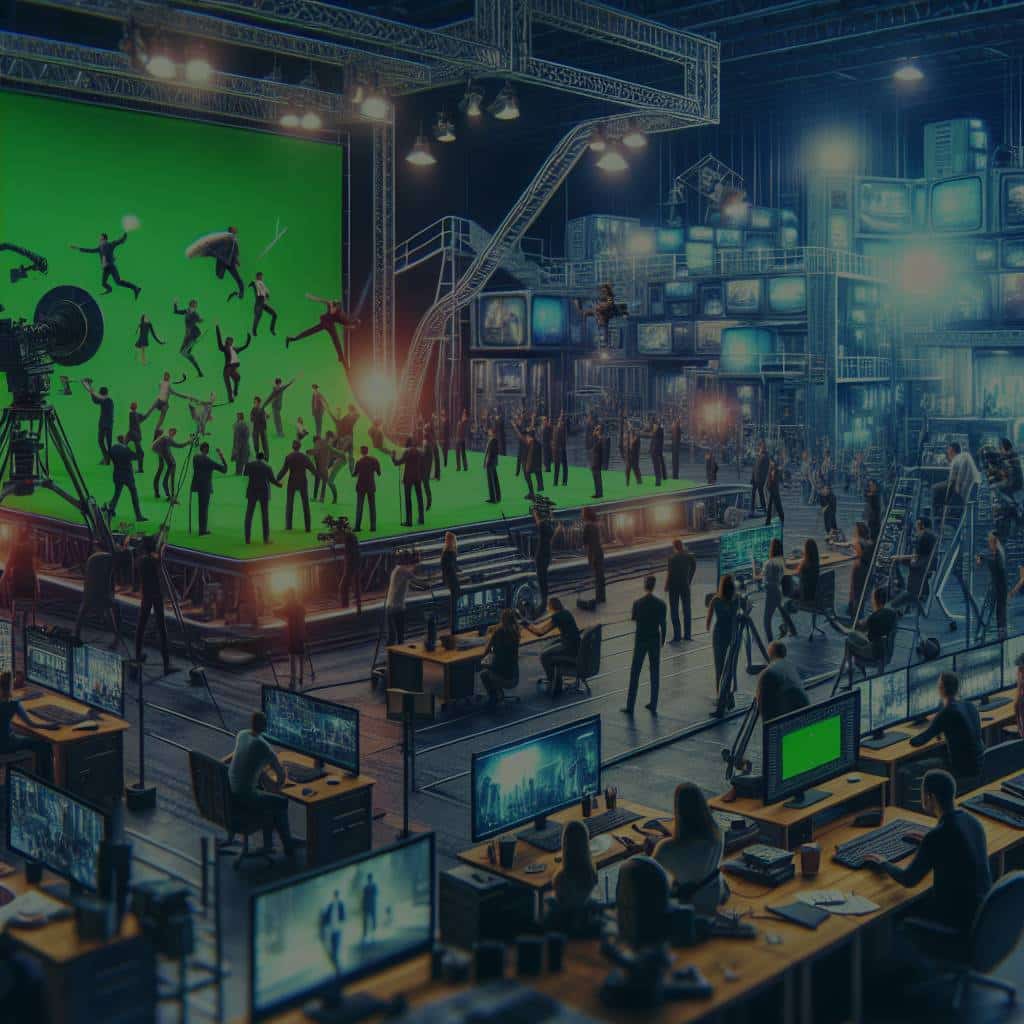How Are British Filmmakers Using Virtual Production to Create Immersive Movies?

In the world of film, there’s a revolution taking place. A digital revolution. British filmmakers are at the forefront, embracing cutting-edge virtual production techniques to create immersive movies that captivate, enthral, and transport audiences into alternate realities. Sharing this journey with you, we delve into the details of this pioneering tech trend and its impact on the British filmmaking industry.
Virtual Production: A Digital Game-Changer
To appreciate the ways virtual production is changing British cinema, let’s start by understanding the concept itself. Virtual production (VP) is the convergence of physical and digital filmmaking, where real and virtual environments coalesce to create visually stunning narratives. It’s filmmaking reimagined through the lens of technology, where LED screens and computer graphics replace traditional film sets, and real-time effects bring digital artistry to life before your eyes.
Also to read : How Does the UK’s Fast Fashion Industry Impact Global Textile Waste?
The star of this digital revolution is the LED video screen. These screens offer filmmakers unprecedented creative freedom. They can transport characters to far-flung galaxies or the heart of a bustling city, all from the safety and predictability of a controlled environment. It’s a real-time, on-demand world where the only limit is the creative imagination.
British Filmmakers and Virtual Production: A Technological Renaissance
British filmmakers have always been innovative, and their adoption of virtual production is a testament to this. The technology allows them to experiment, push boundaries, and redefine what’s possible in the realm of visual storytelling. It’s a renaissance of sorts, but instead of paint and canvas, it’s pixels and LED screens.
Also to see : What Innovations Are There in Minimally Invasive Surgery for UK Hospitals?
From large production houses to independent filmmakers, virtual production is the new gold standard in British cinema. And it’s not just for its visual appeal. The technology also streamlines production time, reduces costs, and offers unparalleled flexibility. Filmmakers can tweak digital settings on the fly, adjust lighting in real time, and make last-minute changes that would be impossible with traditional filmmaking methods.
Telling Stories in New Ways: The Art of Virtual Filmmaking
Virtual production isn’t just about whiz-bang technology and fancy LED screens. At its core, it’s a storytelling tool. And British filmmakers are leveraging it to create movies that resonate on a deeper level. They understand that virtual production isn’t about replacing the real with the digital; it’s about enhancing the storytelling experience.
The technology allows filmmakers to immerse their cast and crew in the digital environments, fostering a deeper emotional connection and enhancing the overall performance. The actors are no longer acting against a green screen; they are in the environment, interacting with it, and responding to it. This creates a more authentic and believable performance, enriching the audience’s cinematic experience.
The Future of British Filmmaking: A Virtual Landscape
As we look ahead, it’s clear that virtual production is set to redefine the British filmmaking landscape. The technology is evolving at an unprecedented pace, and filmmakers are continually discovering new ways to apply it. From tether-free VR headsets to AI-powered character animation, the future of virtual production is bright and brimming with potential.
This isn’t about replacing the old with the new; it’s about creating a harmonious blend of tradition and innovation. British filmmakers are finding ways to retain the heart and soul of their craft while infusing it with the power of modern technology. It’s a delicate dance, but one that holds tremendous promise for the future of British cinema.
Virtual Production: Empowering the Creative Community
Above all, virtual production is an empowering tool for the creative community. It democratizes filmmaking, making the once inaccessible now possible. This is particularly transformative for independent filmmakers, who can now create big-screen spectacles on indie budgets.
British filmmakers are using virtual production to push the creative envelope, tell stories in new and exciting ways, and captivate audiences like never before. They are embracing the future of filmmaking, and in the process, giving us a glimpse of the cinematic wonders that lie ahead. In the world of British cinema, the future is here, and it’s virtually brilliant.
Bridging the Gap: From Traditional to Virtual Production
The transition to virtual production has not happened overnight in the British filmmaking industry. It’s a process that requires a careful balance between retaining the nuances of traditional filmmaking and embracing the new possibilities offered by cutting-edge technology. Filmmakers have to find innovative ways to integrate digital elements into their narratives without compromising on storytelling.
During the production process, filmmakers create scenes using LED screens and virtual environments, facilitated by the Unreal Engine. This game engine helps bring real-time visual effects on set, providing a unique experience for the cast and crew. Additionally, filmmakers use motion capture technology to record actors’ movements and digitally map them onto animated characters. Combined, these techniques allow for a greater range of expression and creativity, fostering a more engaging and immersive cinematic experience.
One of the biggest challenges of virtual production is maintaining authenticity. Filmmakers must remain cognizant of the fact that while technology can enhance the film, the core of any film lies in its story and the performances of its actors. Therefore, they must strike a balance between using technology to improve the visual aesthetics and focusing on the heart of the film – its storytelling.
The Impact on Post Production: A Seamless Process
Virtual production has also significantly changed the dynamics of post-production in filmmaking. Traditionally, post-production was a separate phase where visual effects were added to the raw footage. This process could be time-consuming and expensive, often creating a disconnect between the original footage and the final product.
However, with virtual production, the lines between production and post-production have blurred. Visual effects are added in real-time during filming, resulting in a more seamless and efficient process. This real-time application of visual effects not only saves time and resources but also allows the director to have a better vision of the final product during the film’s production.
Furthermore, virtual production techniques, such as using LED screens for backgrounds, have reduced the need for extensive location shoots or building elaborate sets. This approach has made the production process more accessible and affordable, particularly for independent filmmakers. They can now create stunning visual spectacles that were once only possible with big-budget productions.
Conclusion: A New Era of British Filmmaking
The adoption of virtual production by British filmmakers signifies a significant shift in the film industry. This cutting-edge technology has not only changed the way films are made but has also redefined the cinematic experience for audiences. By blurring the boundaries between the physical and digital worlds, virtual production has opened up a world of possibilities for storytelling.
With its ability to create immersive, visually stunning narratives in real-time, virtual production has become a powerful tool in the hands of filmmakers. It’s not just about the spectacle of CGI or the convenience of digital elements. It’s about empowering filmmakers to tell stories in ways they couldn’t before, pushing the boundaries of what’s possible in cinema.
As we move forward, it’s clear that virtual production is not just a fleeting trend but a cornerstone of the future of British filmmaking. It promises to continue revolutionising the industry, shaping the way stories are told and experienced. In the world of British cinema, the digital revolution has only just begun, and it’s set to take us on an exciting, immersive journey.
